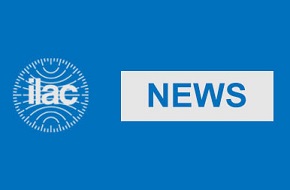
I. ARAC MLA Signatories
Following the latest ARAC MLA Group decision ARAC has 5 MLA signatories:

II. New ARAC member: Djibouti’s Agency for Standards and Quality Promotion
Significant growth in the Arab Accreditation Cooperation (ARAC) membership has been achieved with the acceptance of Djibouti’s Agency for Standards and Quality Promotion (ADNQ) as an ARAC Associate Member. This new membership was approved following a 30-day ballot and review period by the ARAC Executive Committee and ARAC General Assembly members.
ADNQ has the mission, in collaboration with all the ministerial departments and the private organizations concerned, to contribute to the implementation of the policy of the Djiboutian government in the field of accreditation, standardization, metrology, certification and promotion of the quality of products and services.
ARAC now has 22 members covering 20 Arab countries (Algeria, Bahrain, Djibouti, Egypt, Iraq, Jordan, Kuwait, Lebanon, Libya, Mauritania, Morocco, Oman, Palestine, Qatar, Saudi Arabia, Somalia, Sudan, Tunisia, United Arab Emirates and Yemen).
III. Arab Accreditation Week 2023:
In its fourth edition and on the occasion of World Accreditation Day 2023, ARAC organized the Arab Accreditation Week [AAW] during the period 05-09 June 2023 under the theme “Together towards enhancing the role of accreditation in the Arab region in supporting the Future of Global Trade”.
Several online capacity-building activities were held during the AAW 2023 to strengthen the ARAC AB members and conformity assessment bodies’ competencies and to harmonise the implementation of the IAF, ILAC and new accreditation standards requirements.
1. Regional workshop on ILAC Policies
More than 300 participants from the ARAC ABs and their accredited CABs participated in this regional workshop. The main purpose of this workshop is to harmonize the accreditation practices among ARAC members and support the enhancement of members’ capacities in operating existing accreditation schemes of common interest to ARAC members.
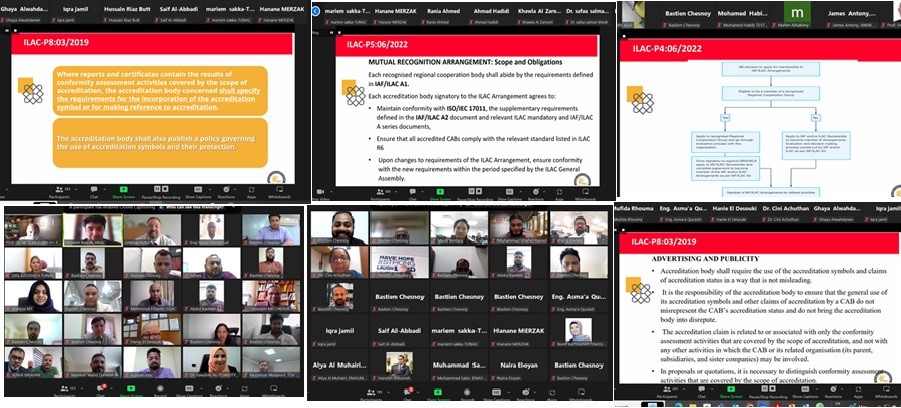
ARAC Regional Workshop on ILAC Policies
2. Regional Training session on Measurement Uncertainty software
With the participation of testing & calibration laboratories in the Arab region, this training session was conducted on software that evaluates the measurement uncertainty by the propagation of variances and/or propagation of distributions using Monte Carlo simulations, according to the methods described in the Guide to the Expression of Uncertainty in Measurement (GUM) and its Supplement 1 (GUM S1), respectively.
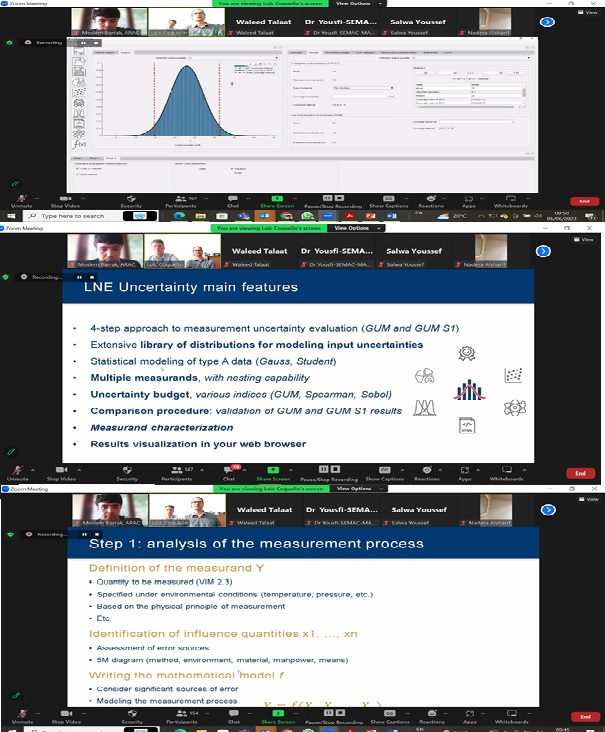
ARAC Regional Training session on Measurement Uncertainty software
3. Regional Workshop on IAF Mandatory Documents
The event will be conducted in the context of implementing the ARAC capacity-building program. The main purpose of this workshop is to ensure that Accreditation Bodies and their accredited certification or validation/verification bodies in the Arab Region operate their programs in a consistent and equivalent manner. This workshop will provide a complete overview of the IAF Mandatory Document and will give general key insights and tools to comply with the requirements of these MDs.
4. Medical laboratories: ISO 15189:2022 transition regional workshop
Further to the publication of the new version of ISO 15189:2022 Medical Laboratories – Requirements for quality and competence and following the resolution endorsed by the ILAC General Assembly that allows a 3-year implementation period from the date of publication of this revised standard, this regional training session will support the Accreditation Bodies and Medical Laboratories in the Arab region in successfully transitioning to the new version of the standard relating to the competence and quality of Medical Laboratories.
This workshop focused on the key updates and critical changes for medical laboratory services, outlining the transition considerations of ISO 15189:2022 from ISO 15189:2012, including, but not limited to the focus on clinical utility, obligations to the patient and risk management.
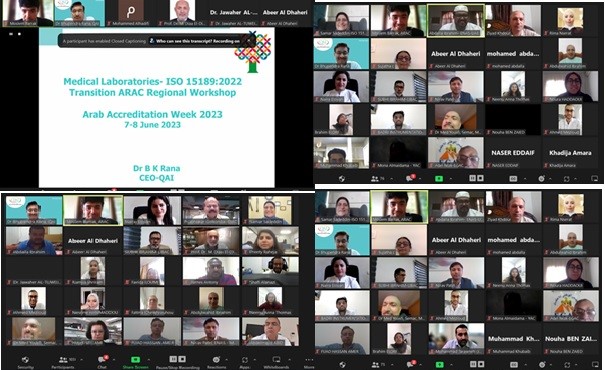
ARAC transition regional workshop on ISO 15189:2022
IV. Establishment of PTP Network Information System in the Arab region
Following the recommendation taken during the ARAC stakeholders community workshop held in December 2022, Cairo, Egypt, the Arab Proficiency Testing Providers Network Information System was established at the end of September 2023. This PTP Network IS will support the CABs in the Arab region in finding a suitable Proficiency Testing scheme provided by the PTPs in the Arab region.
This PTP Network Information System is open to any of the PT providers that are operating in the Arab region who wish to include their programs in the database.
V. ARAC upcoming events:
5th – 7th December 2023: Newcomer ARAC Peer Evaluators training course, Riyadh, KSA
8th – 9th December 2023: Capacity and refresher ARAC Peer Evaluators training course, Riyadh, KSA
10th – 14th December 2023: 11th ARAC Annual Meetings, Riyadh, KSA
The contact details for the ARAC Secretariat are:
Email: secretariat@arabarac.org
Website: http://www.arab-accreditation.org
Tel: +212 600 78 56 78

San Marino Accreditation Service is a new EA Member
San Marino Accreditation Service (SMAS), the National Accreditation Body of San Marino, fulfills the requirement set out in EA-1/17 S1 Criteria for Membership. SMAS becomes a new EA Member.
San Marino Accreditation Service (SMAS) is a small accreditation body with top manager Denis Cecchetti and technical director Linda Sartini.
SMAS is the only National Accreditation Body in the Republic of San Marino. It was established as a division of the Economic Development Agency – Chamber of Commerce S.p.A. (EDA-CC) through the Law No. 71 of 26 May 2004 which provides that the Chamber of Commerce performs a service of public interest. SMAS exists to facilitate the exchange of products and services and conducts the accreditation body function exclusively for certification bodies.
The launch of the National Accreditation Body of San Marino is part of the national strategy to structure the Republic of San Marino as an Official Business Gate. It is also an initiative to align the jurisdiction with international standards in view of the Association Agreement with the EU.
EA has 49 Members from the European Union and the European Neighbourhood Policy. Click here to access the full Directory of EA Members, and here to access to SMAS website.
Click here to read the full interview of SMAS.
Training
EA organized two training sessions: one Refresher Training for Team Members (TM) authorized for Product certification and Inspection, and one Train the trainer course on ISO 15189:2022.
The Refresher Training for TM authorized for Product certification and Inspection covered the outcome of the application review, criteria for selection of team members, witnessing, decision-making process, latest EA MAC Decisions, documents related to the peer evaluation process, revision of EA-2/02 EA Procedure for the evaluation of a National Accreditation Body following the completion of the re-engineering project, and MS Teams under EA One Drive – the platform used for peer evaluations.
The Train the Trainer course on ISO 15189:2022 focused on the relevant changes of the new standard ISO 15189:2022 and where particular focus is needed.
Publication of three EA Reports
EA published three reports between May and July 2023:
Approval of the Memorandum of Understanding on the European Quality Infrastructure
The General Assembly approved the Memorandum of Understanding (MoU) between CEN, CENELEC, EA, EURAMET, and WELMEC on creating and implementing the European Quality Infrastructure. This MoU aims to create the European Ql Network, a partnership of regional quality infrastructure organizations that collaborate to strengthen the Quality Infrastructure in Europe.
Video on the EU Emission Trading System
EA released a video on the EU Emission Trading System (ETS) and the role of accreditation. The EU ETS is the first international emissions trading system. It was established in 2005 and remains the largest carbon market. It is a vital part of the EU policy to counteract climate change and a tool to reduce greenhouse gas emissions cost-efficiently.
Click here to watch the video.
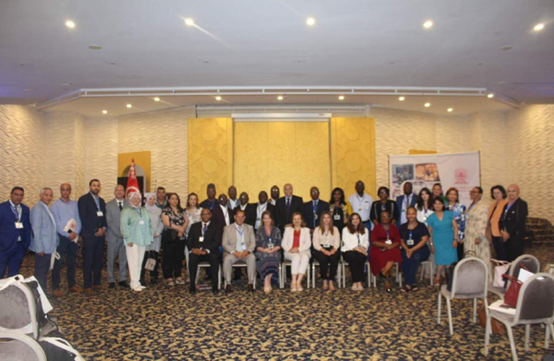
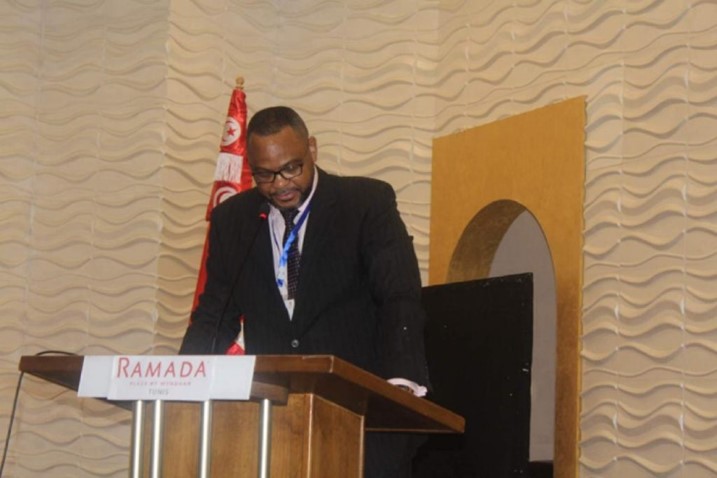 Dr. Ron Josias, the AFRAC Chair during the Opening Ceremony |
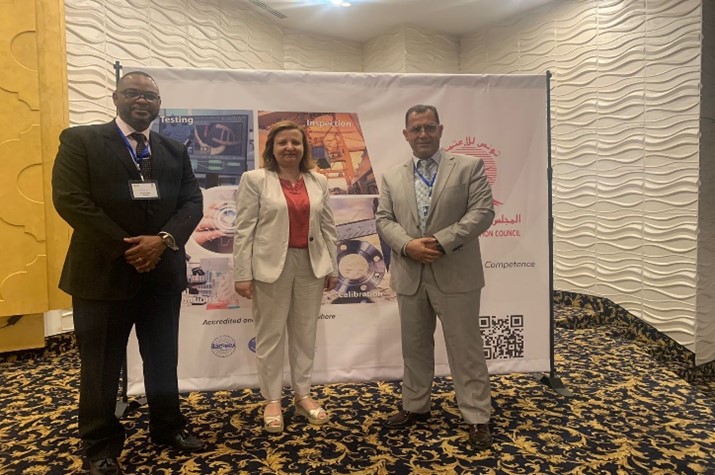 The Minister for Trade and Industry, Tunisia, CEO TUNAC and the AFRAC Chair |
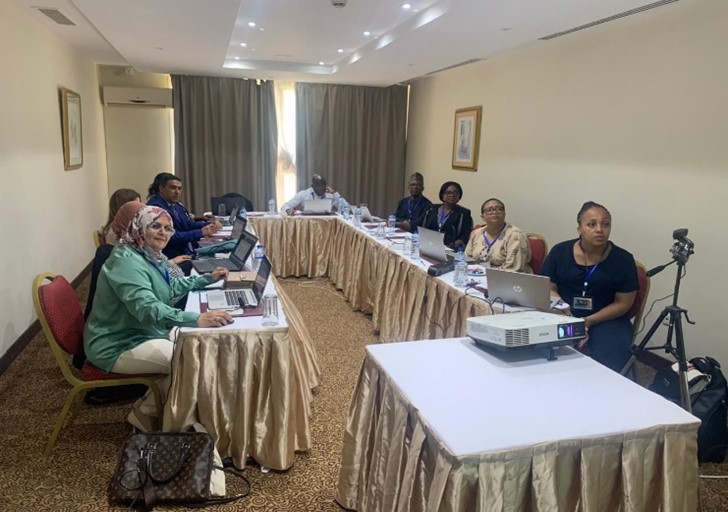 AFRAC Delegates following proceedings at the Technical Subcommittees |
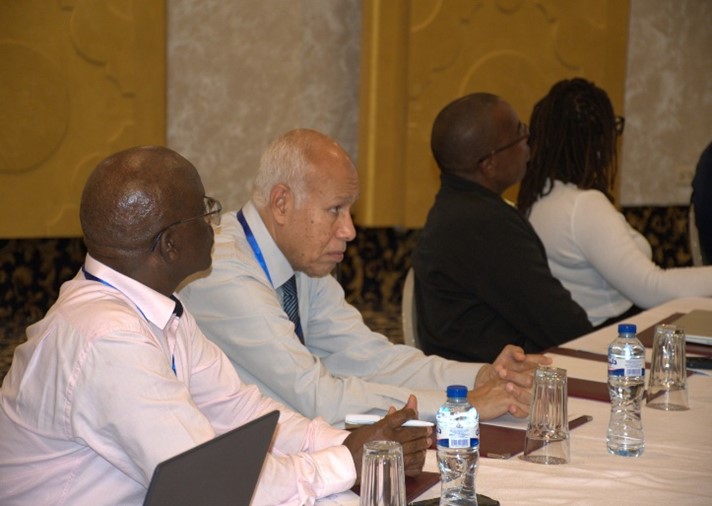 Critical Thinking focusing on next steps |
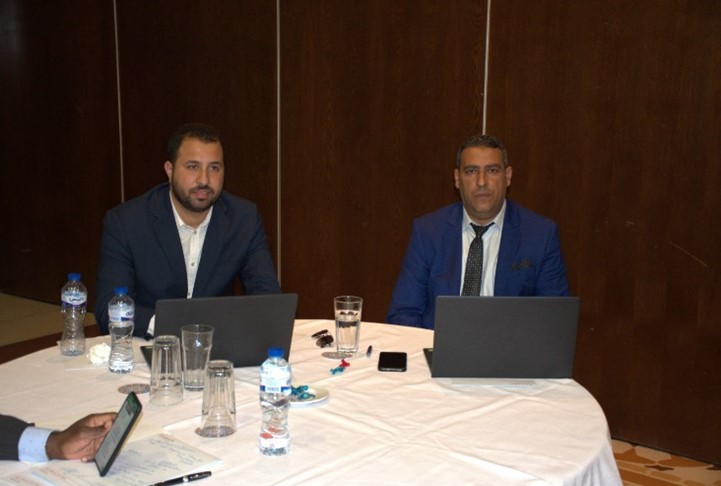 TUNAC Delegates following proceedings |
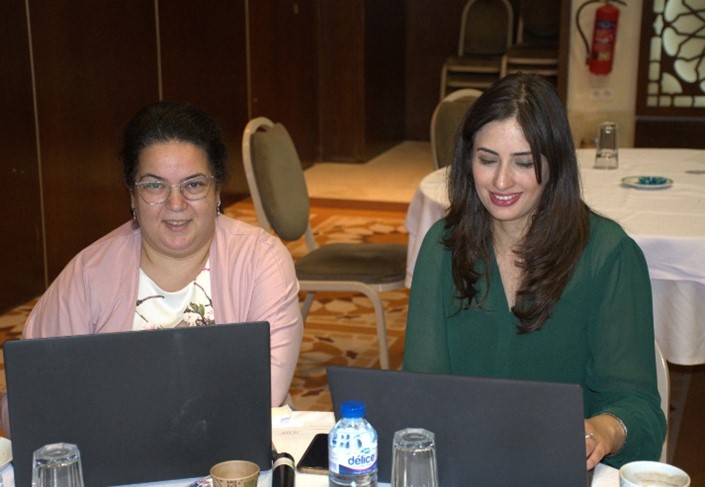 TUNAC Delegates following proceedings |
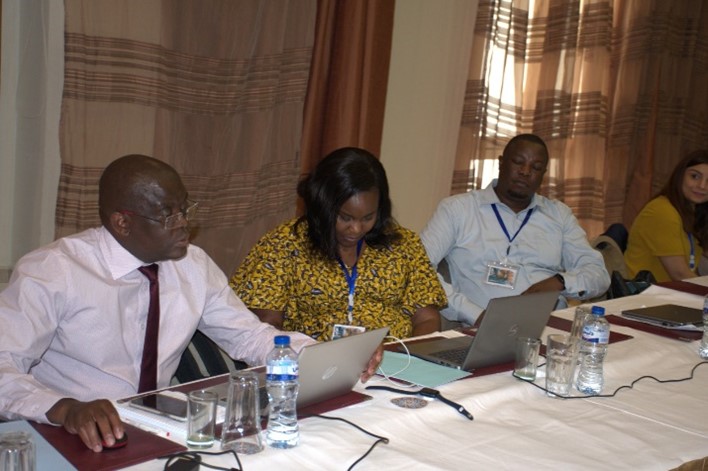 Technical Committee Meeting Chaired by Thabo Chesalokile of SANAS |
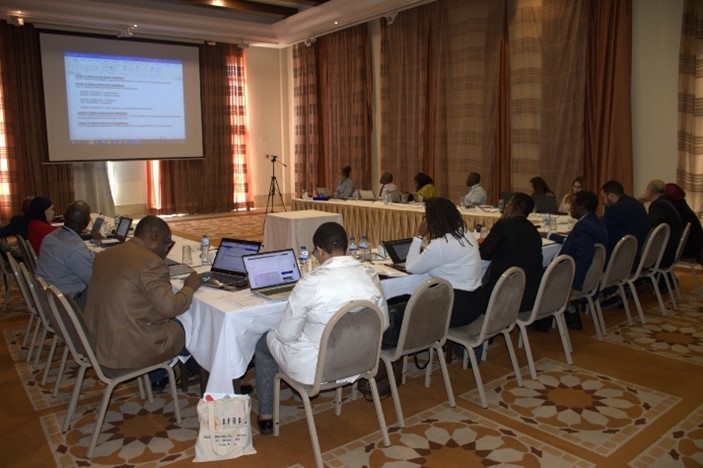 AFRAC MCC Meeting |
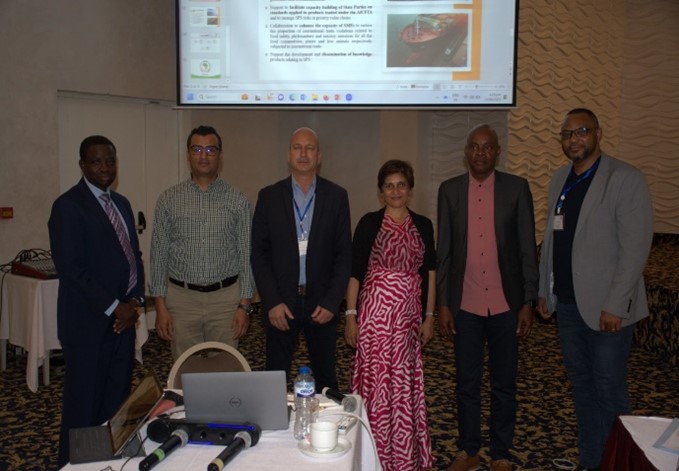 Awareness session on the AfCFTA |
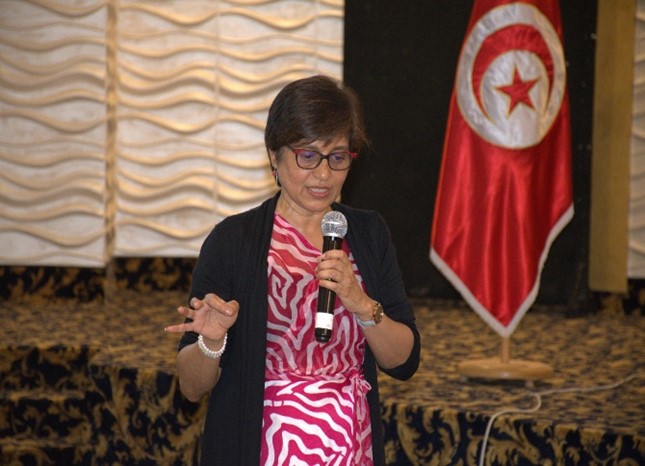 Ms Deneswaree Mohun |
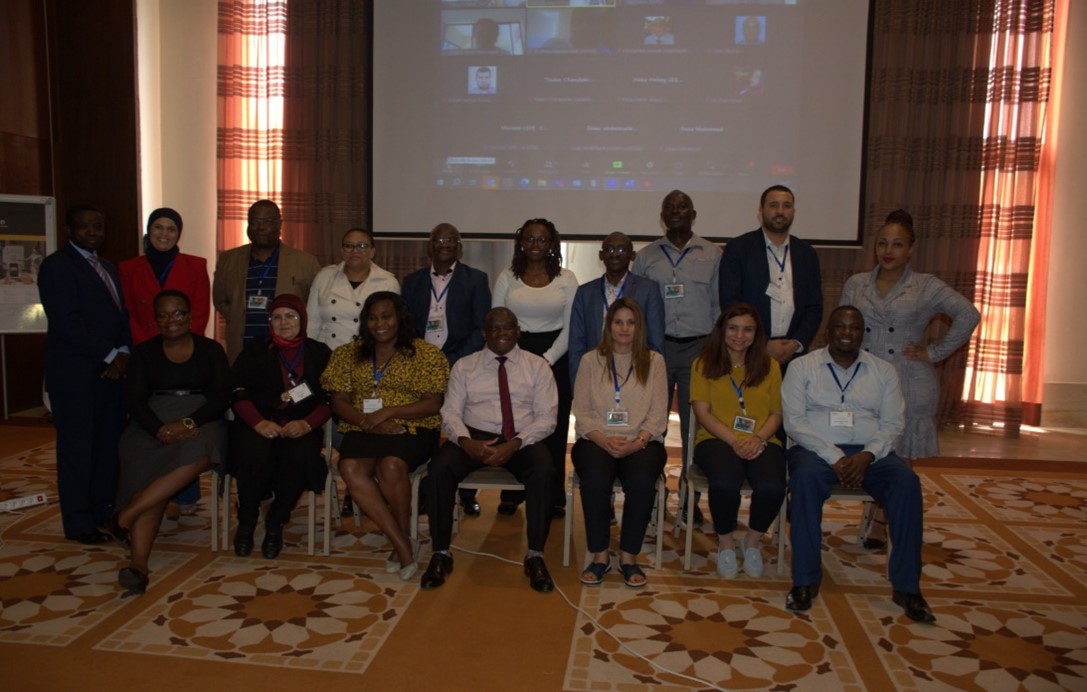
Training on IAF MD25 conducted by Sonia and Ghada of TUNAC
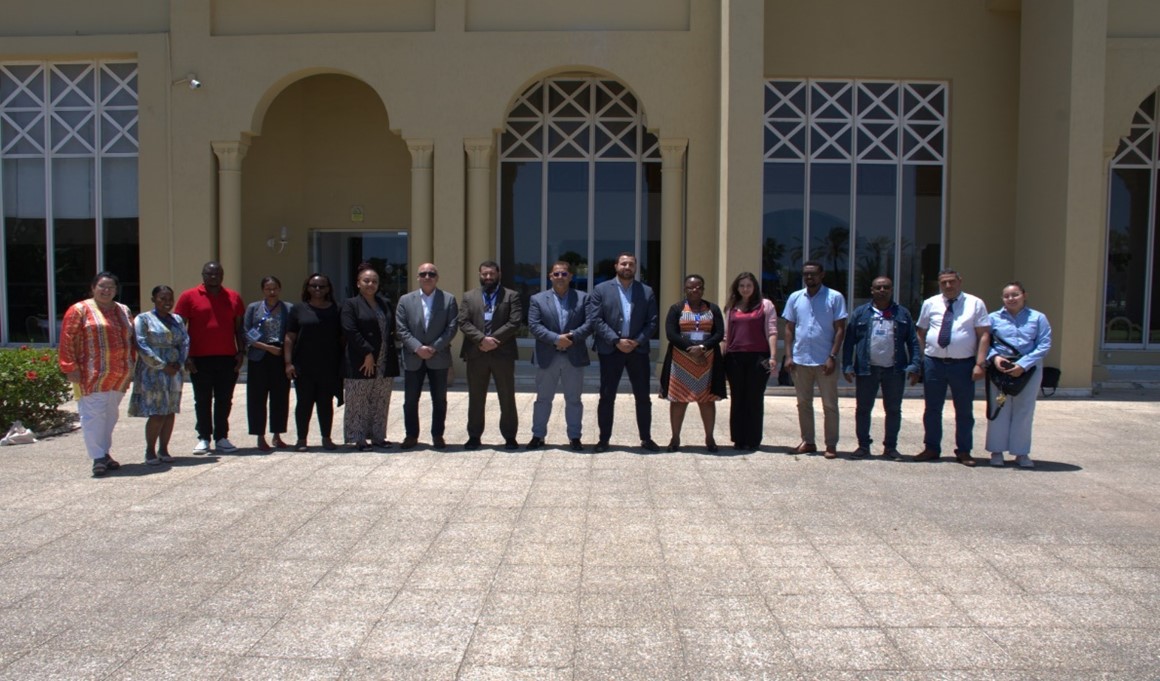
AFRAC members attend the Joint ILAC MCC & IAF CMC Mid-Term Meeting
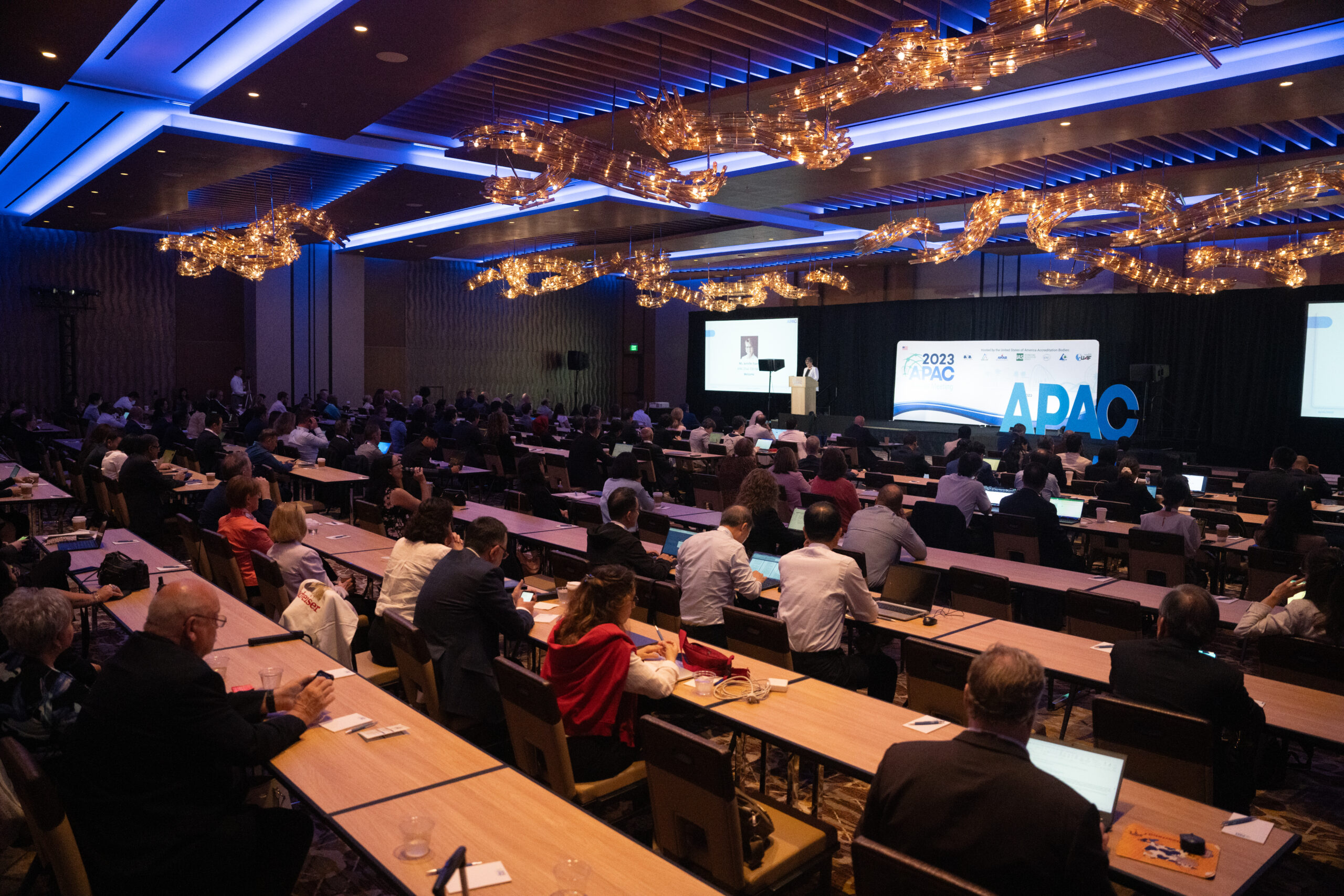
The 2023 Asia Pacific Accreditation Body Cooperation (APAC) Annual Meeting took place from June 23 to July 1, 2023, at the JW Marriott Resort in Anaheim, California. This marked a significant milestone as it was the first in-person annual meeting for APAC since 2019, due to the pandemic. The event drew over 150 delegates from 27 economies who came together for this important gathering.
The APAC 2023 meeting was hosted by APAC’s Full Members based in the United States of America, which included the American Association for Laboratory Accreditation (A2LA), AIHA Laboratory Accreditation Programs (AIHA-LAP), ANSI National Accreditation Board (ANAB), International Accreditation Service (IAS), IOAS, Perry Johnson Laboratory Accreditation, Inc. (PJLA), and United Accreditation Foundation (UAF).
The event’s schedule commenced on Friday, June 23, with a select group participating in the APAC-PTB ADAPT WG / PSC Meeting. Additionally, the APAC MRA Management Committee meeting, the Executive Committee meeting and a two-day APAC Nominated Evaluator Training were held starting on June 24th. Over the weekend, members of the Joint ILAC/IAF Communication & Marketing (CMC) also convened for discussions.
The official Opening Session took place on Monday, June 26th, and began with a warm welcome from Jennifer Evans, APAC Chair, and CEO of NATA. Jennifer was followed by Raj Nathan, APAC Vice Chair and President of IAS, who extended a warm welcome on behalf of the host economy, the United States. Raj also introduced the leaders of all the U.S. Host Accreditation Bodies.
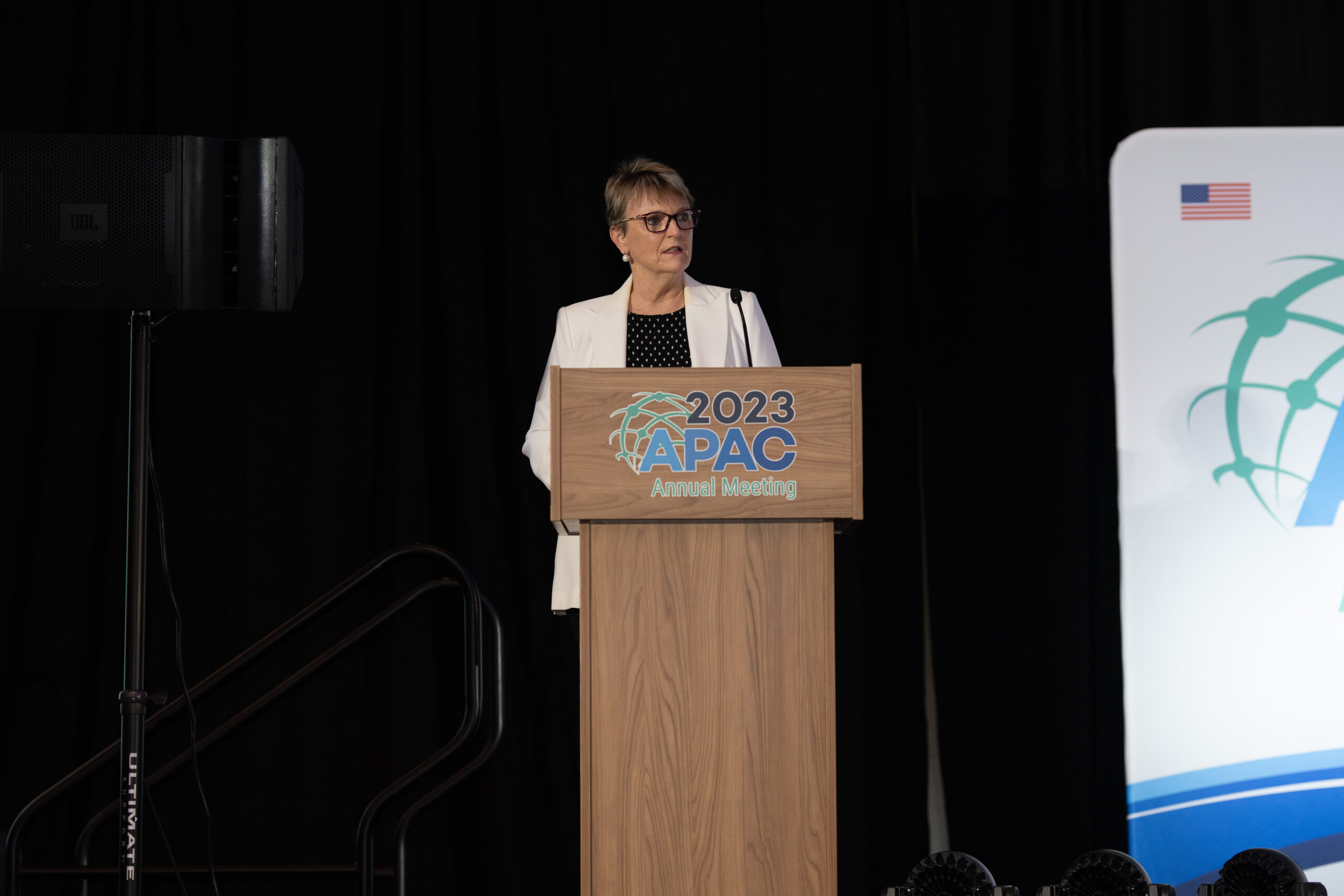 |
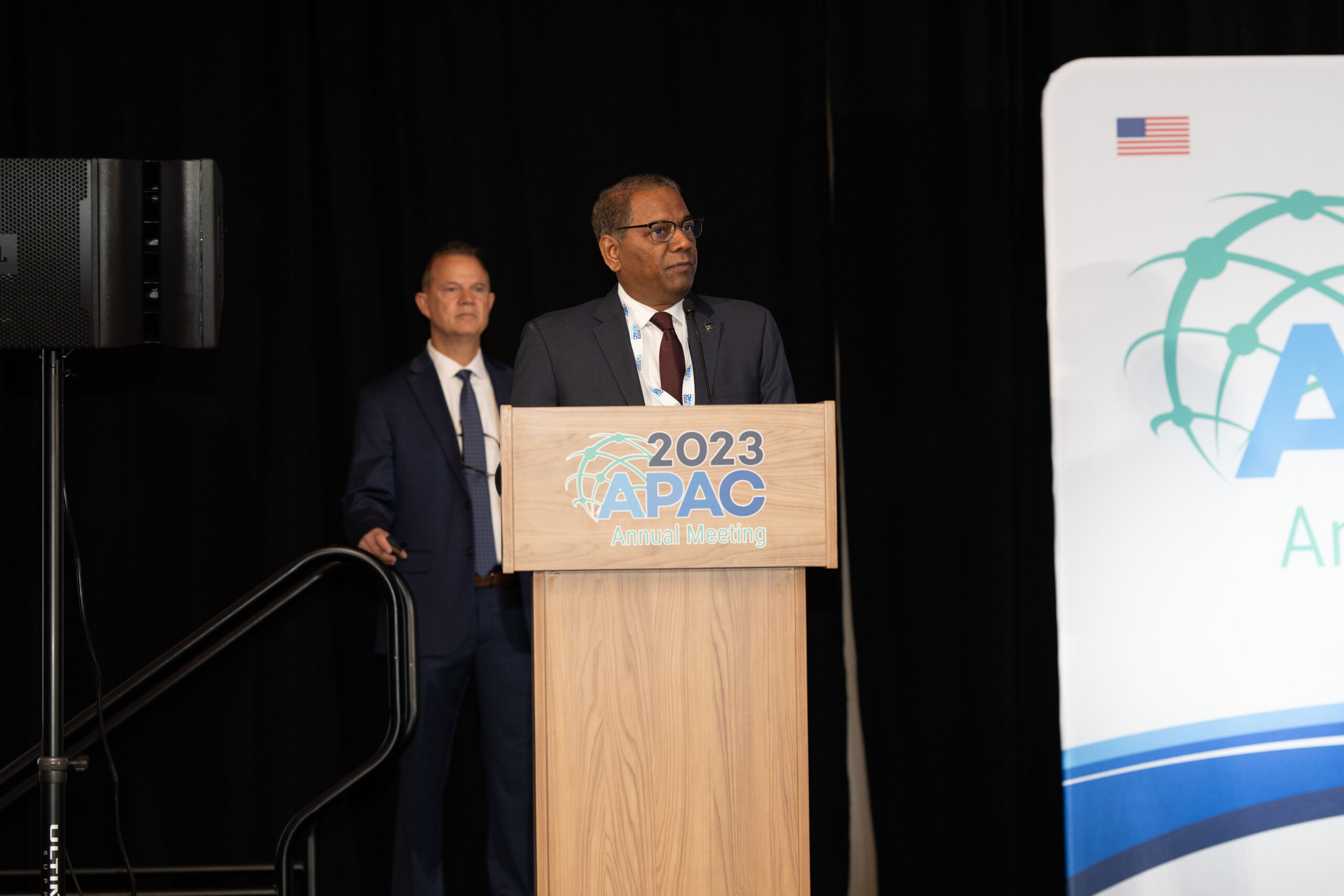 |
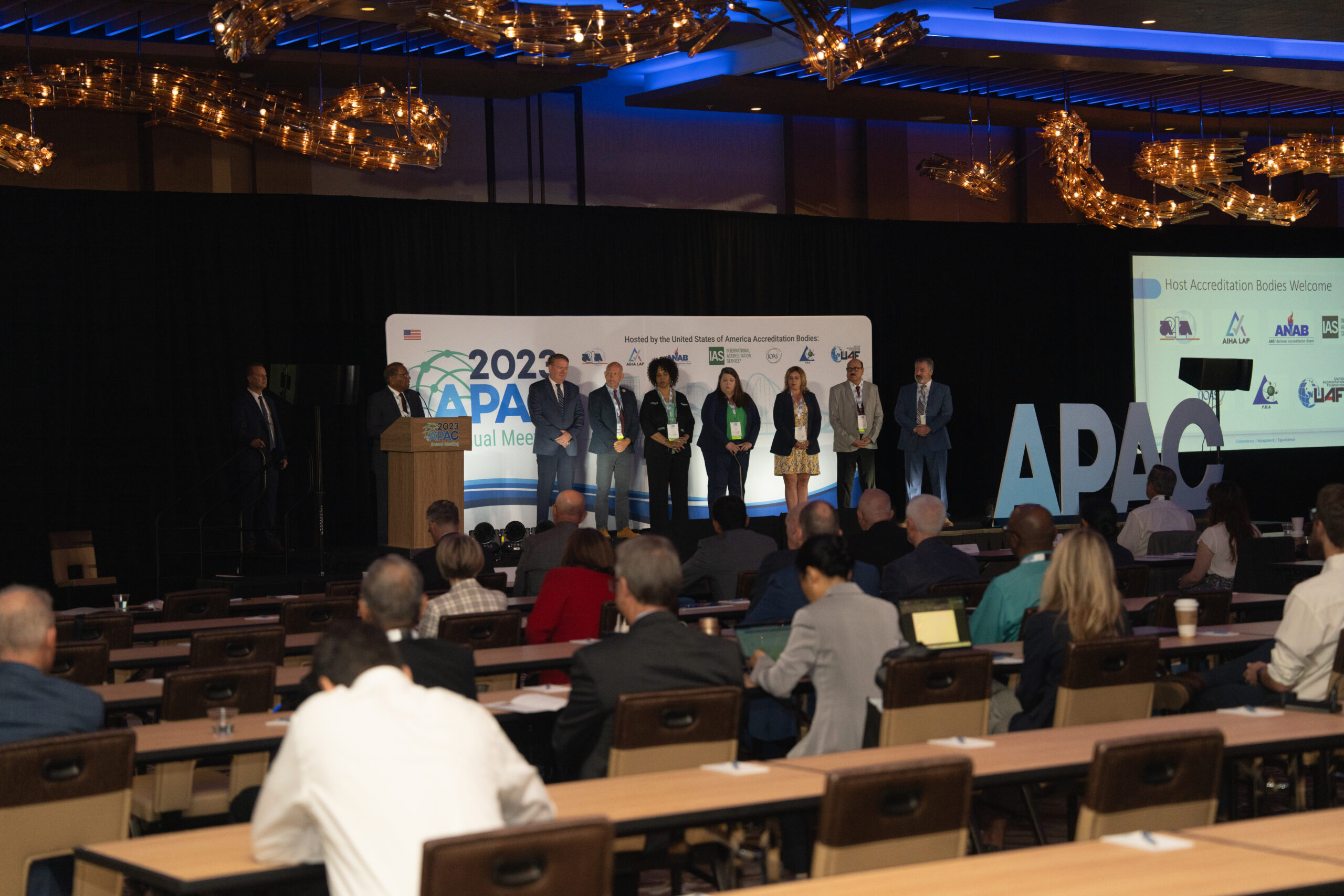 |
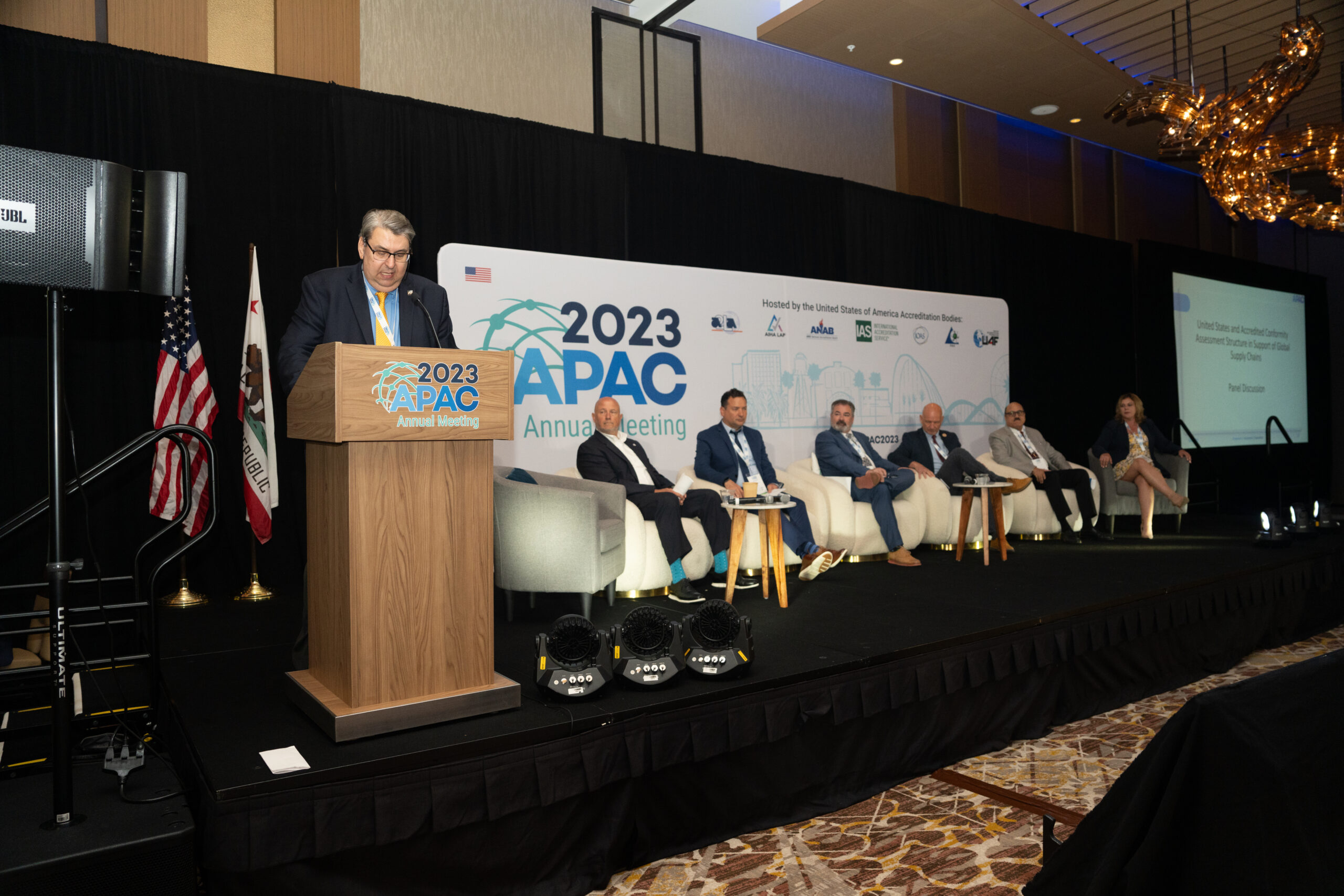 |
The Opening Session featured a cultural presentation by Red Boy Productions, a Native American Dance Troupe that showcased traditional dances from multiple tribes and provided insight into their culture. The Opening Session also featured presentations from notable individuals such as Stephen Faessel, Anaheim City Council Member; Kent Shigetomi, Director of the Multilateral Non-Tariff Barriers Office at the U.S. Trade Representative; Rick Titus, Accreditation Assets & Strategy Manager for UL Solutions; Sam Palmer, Former Assistant Director for the Clark County Department of Building and Fire Safety in Las Vegas, Nevada; DeAnn Benesh, Past President of AOAC International; and Osama Younan, General Manager and Superintendent for the City of Los Angeles Department of Building and Safety. These presentations primarily centered on the regulatory perspectives of accreditation and the significance of mutual recognition across international borders.
The Opening Session concluded with a panel discussion featuring presentations by members of the U.S. host accreditation bodies. The theme for the panel discussion was “United States and Accredited Conformity Assessment Structure in Support of Global Supply Chains”. The presentations and discussions underscored how the United States has benefited from the principles of the World Trade Organization, including the promotion of fair competition among Accreditation Bodies. It was highlighted that the presence of multiple Accreditation Bodies competing within the same market in the U.S. has positively impacted promptness, customer service, and, most importantly, choice. To cap off Monday evening, a Welcome Reception was held on the rooftop of the J.W. Marriott, featuring a DJ for entertainment and a breathtaking view of the fireworks display from Disneyland.
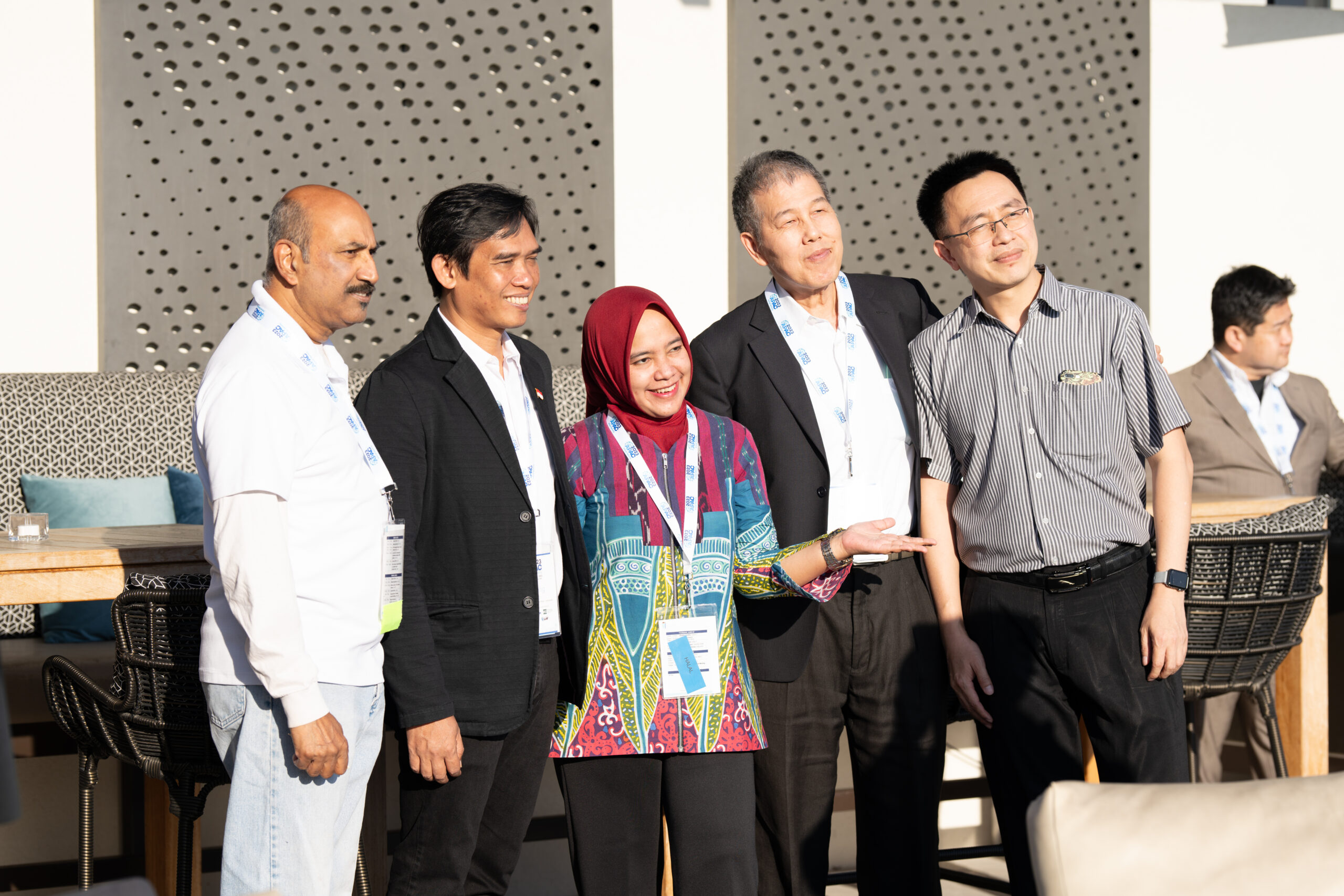 |
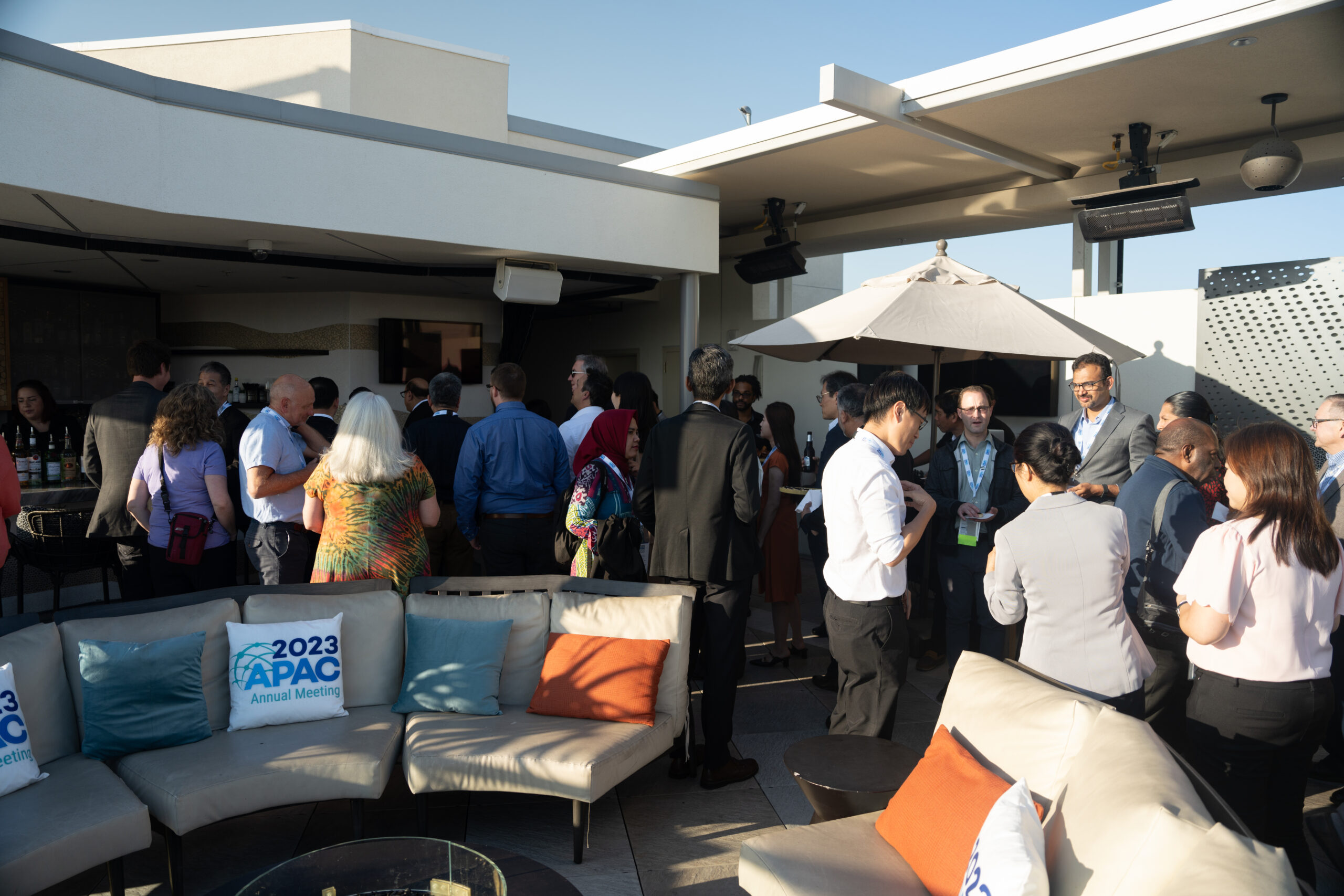 |
|
|
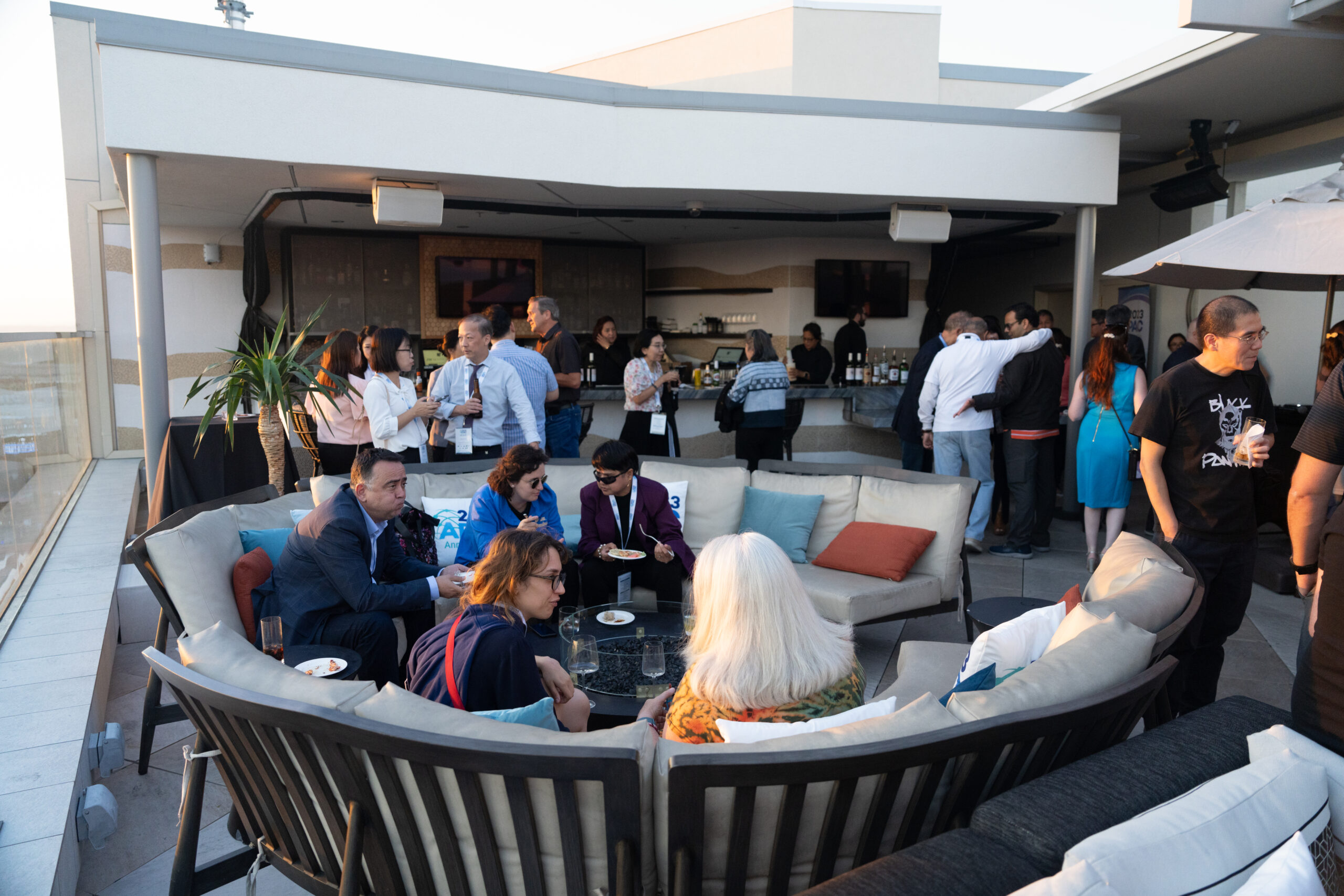 |
|
|
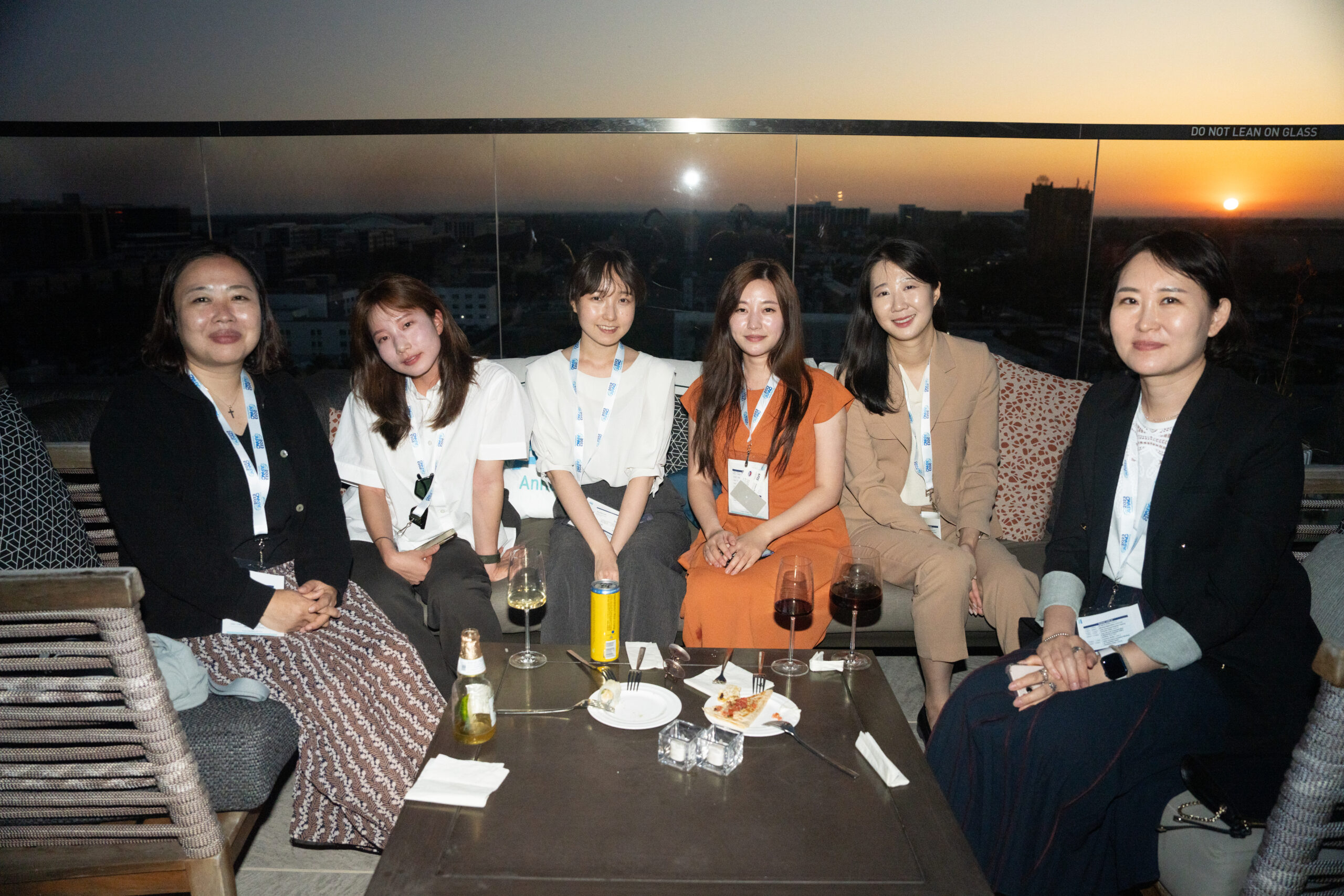 |
|
|
 |
Throughout the week, delegates actively participated in Working Groups and Technical Committee meetings, addressing the MLA/MRA activities of APAC. The APAC Communication & Promotion Committee also convened to explore ways to promote accreditation and highlight the work undertaken by the various APAC committees.
With the APAC community reuniting in person after four years, the overarching theme was to “Celebrate Accreditation”. The hosts organized several social events for members. One of the standout moments of the meeting was the Hollywood-themed Cocktail Reception and Official Banquet Dinner held on Thursday evening. Participants particularly enjoyed the live music, magician performances, and caricature artists that added to the evening’s entertainment.
Upon the conclusion of the APAC 2023 Annual Meetings, the host economy distributed a survey link to gather feedback from attendees regarding the Annual Meeting. Attendees expressed high satisfaction with various aspects of the event, however noted opportunities to shorten the meeting timeframe. Overwhelmingly, attendees noted that face-to-face interactions with both familiar and new colleagues were a highlight of the Annual Meetings.
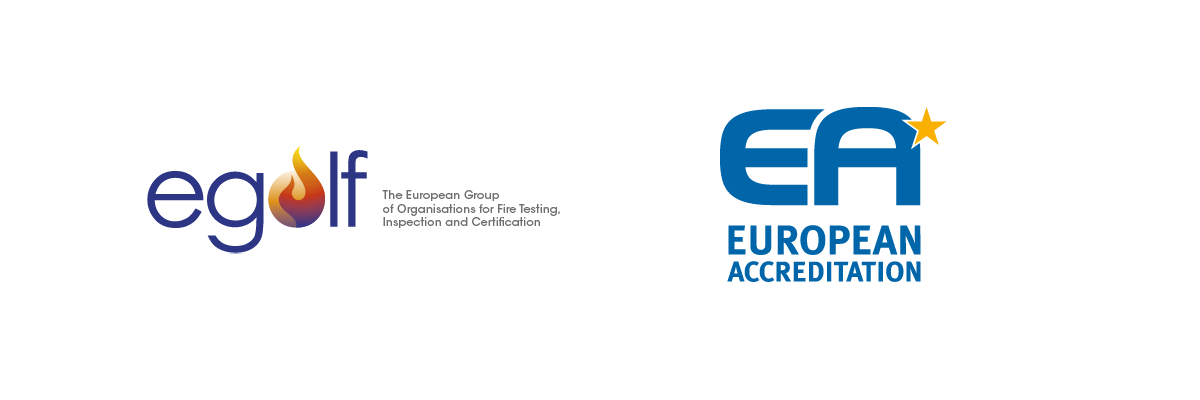
A fire laboratory assesses the performance of a product by testing according to a test method (notably the European test standard). Based on different measurements (e.g., temperature, radiating heat flux, etc.) but also from observations, the fire laboratory will provide the fire performance based on criteria and thresholds given in the test standard. The description of the product, the measured values, and the resulting fire performance are given by the laboratory in a fire test report.
Based on test reports, the fire laboratory issues a European classification report or national approval according to the rules specified in the classification standards.
Some National Accreditation Bodies agreed to accredit according to ExAp1 (extending the field of application) and classification standards2, however some didn’t.
ExAp application is not a test standard and is not a product standard. This was therefore discussed in relation to which is the most relevant accreditation standard covering the technical aspect of the ExAp standard. Many fire laboratories accredited according to EN ISO/IEC 17025 are also accredited as certification bodies according to EN ISO/IEC 17065. However, there are fire laboratories accredited to only EN ISO/IEC 17025 and Notified Bodies accredited only to EN ISO/IEC 17065.
EGOLF (the European Group of Organisations for Fire Testing, Inspection, and Certification) decided to support accreditation to EN ISO/IEC 17025 but asked for a common approach. As part of its harmonization mission, the EA Laboratory Committee (EA LC) established a new Task Force Group to clarify the situation.
The EA LC agreed that each laboratory can apply to be accredited by its National Accreditation Body for both Fire Classification & ExAp standards using ISO/IEC 17025 requirements on Opinions & Interpretations.
This represents a step towards harmonization (even if a NAB may decide not to develop such an activity).
EGOLF welcomed this approach as an excellent starting point since some laboratories did not previously have the possibility of accreditation for Fire classification and ExAps.
Thanks to the EA LC TFG, the way for laboratories to apply for accreditation to EN ISO/IEC 17025 and to perform assessments is now understandable and simplified.
1 In the fire testing field, you cannot test any size or characteristics of a certain product. The DiAp (Direct Field of application) given in each European test standard allows application scope directly from the fire test. The DiAp depends on the product properties and/or intended end-use applications (e.g., the size of the door leaf).
It is assumed that the same test results will be obtained if we test the item with minor differences in shape, dimension, etc.
ExAp means Extended field of Application. ExAp rules are also specified in the European standard called the ExAp standard. ExAP allows a larger application domain than DiAp.
This larger domain is accepted based on additional information. This information may come from additional tests, additional measurements during the test, and specific calculations. Those are defined in the ExAp standard (the application of these rules requires knowledge of tests standards and interrelation of the ExAp standards).
2 The classification standards define the criteria and threshold for defining the performance classification of the fire product. The input for the Fire Classification report is the test reports (including the DiAp) and ExAp reports. The existing classes are defined at the European level allowing the circulation of products. The level of performance required for a building is defined by Member states.
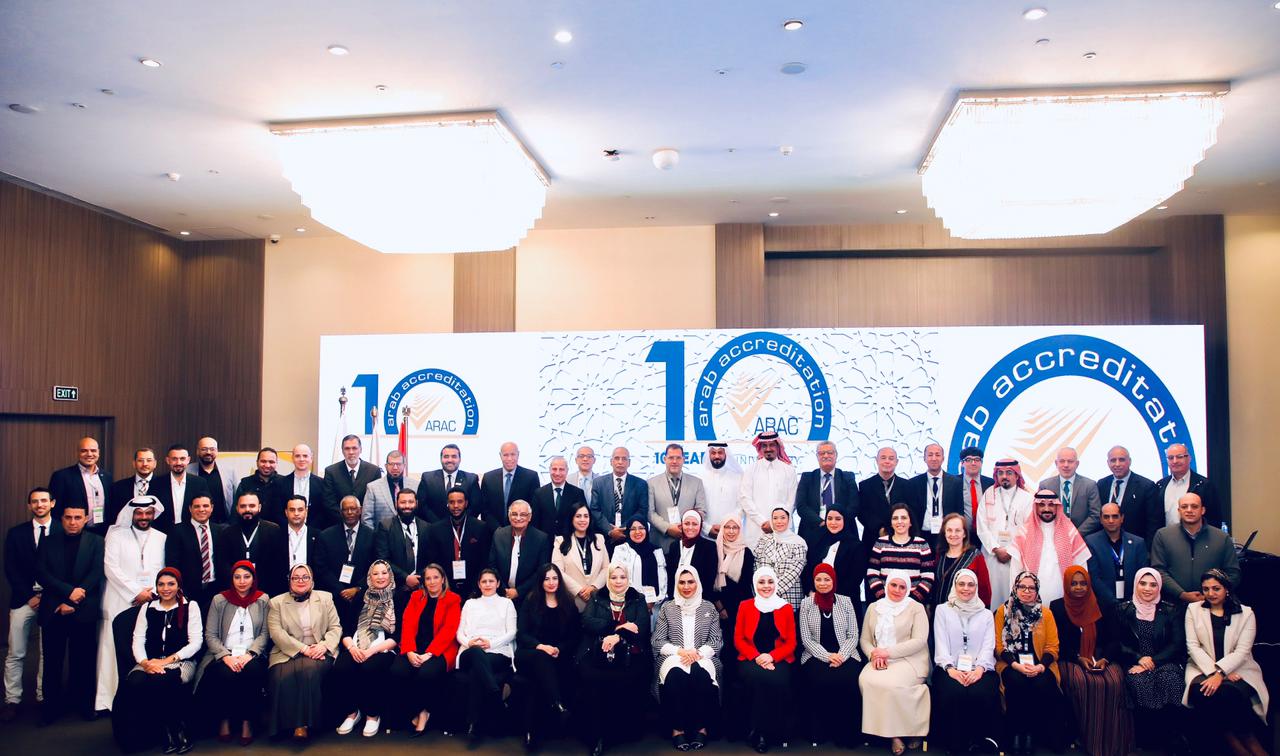
I. ARAC MLA Signatories
Following the latest ARAC MLA Group decision ARAC has 5 MLA signatories as the following:

II. ARAC 10th Annual meetings:
After much planning, ARAC has held very successfully its 10th Annual Meetings in Cairo, Egypt, from 04th to 8th December 2022 hosted by the Egyptian Accreditation Council [EGAC]. The schedule for these meetings was exceptionally busy and particularly so given the significant number of Committees & Working Groups meetings and events such as the 2nd ARAC community stakeholders workshop, the celebration of ARAC 10th anniversary and the capacity building activities that included Regional training workshops on Remote Assessments/Peer Evaluations using the Augmented Reality Glasses and the key documents/records to prepare for the ARAC Peer Evaluation process.
Significant achievements were made at these meetings including the approval of the ARAC new strategy covering the period 2023-2025 and the decision to extend the ARAC MLA structure to include Proficiency Testing Providers, Reference Material Producers & Biobanking (all level 2) and Medical Devices Management System (MDMS), Information Security Management Systems (ISMS), Occupational Health & Safety Management Systems (OH&S MS) and Educational Organizations Management Systems (EOMS) (at level 4).
III. ARAC Stakeholders Community Workshop in Egypt:
The awareness stakeholder workshop was conducted on 05th December 2022 with more than 150 participants from the ARAC stakeholder community representing the conformity assessment bodies, regulatory authorities, industry & trade associations and consumer associations in Egypt.
During this workshop, the participants stressed the role that ARAC plays in the development of the accreditation and conformity assessment infrastructure in Egypt. The aim of this workshop was for stakeholders in Egypt to have a better understanding of the value of accreditation and accredited services, and in particular, for regulators to recognize and accept accredited conformity assessment results covered under the ILAC MRA, IAF MLA and ARAC MLA.
IV. ARAC New Strategy 2023-2025
ARAC members have adopted a new ARAC strategy to guide ARAC work through the period 2023-2025 with a new vision “The leading accreditation group facilitating regional and global trade and supporting sustainable development”. It is based on the 4 pillars: International recognition, Operational excellence, Cooperation & Partnership and Capabilities Development. The main objective is to strengthen all interested parties’ confidence in accreditation and enhance ARAC into a professional, efficient service provider serving the ARAC Accreditation Bodies’ Members and stakeholders.
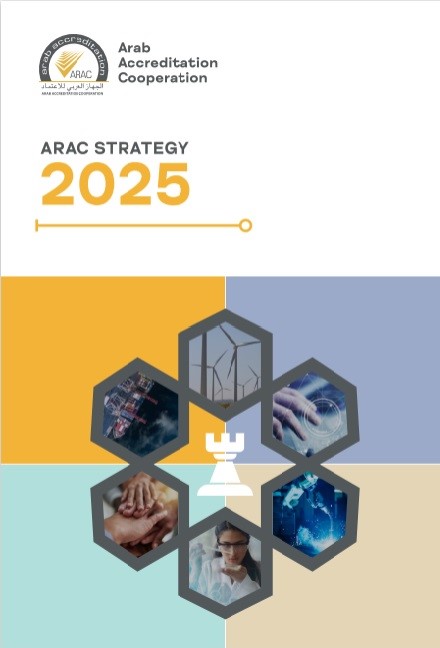
CoverPage_ARAC Strategy2025
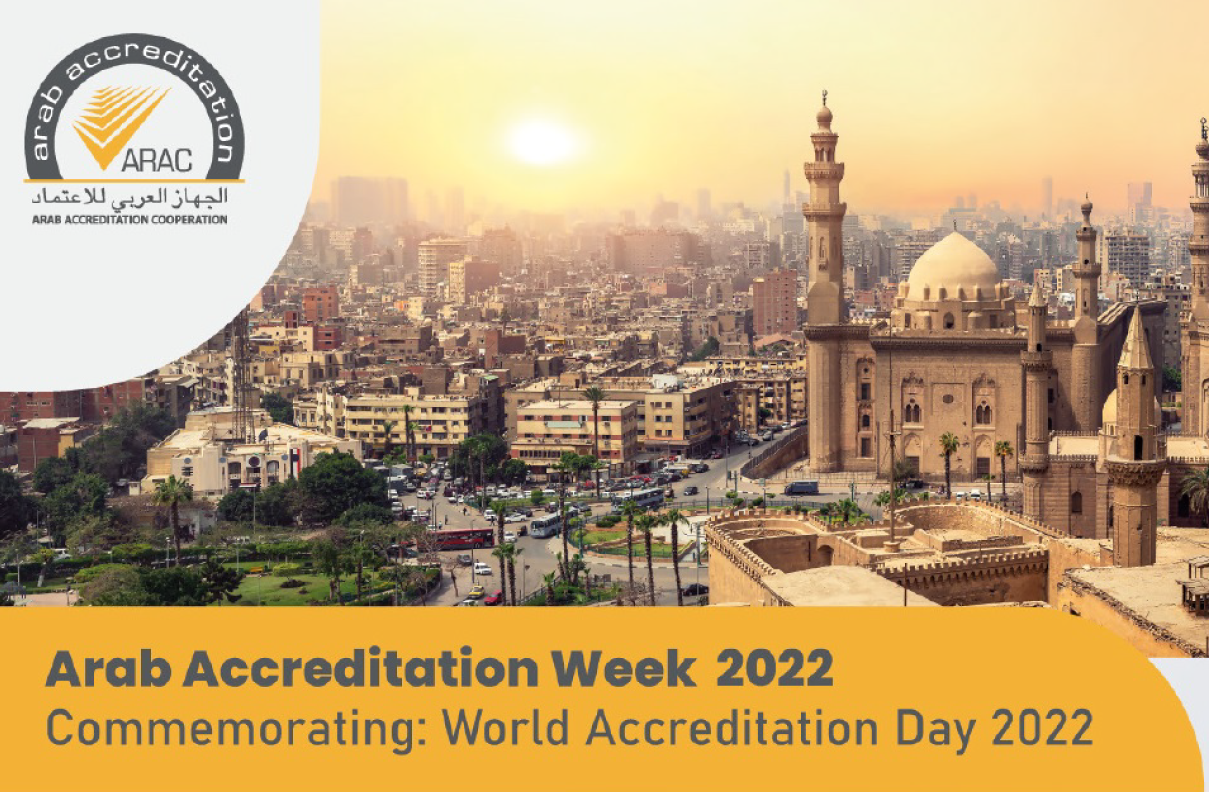
1. ARAC trains newcomers to ARAC peer evaluation teams
Emirates International Accreditation Centre EIAC in Dubai hosted the 3rd ARAC newcomer peer evaluators training course during the period 27-31 March 2022 to impart future teams of ARAC peer-evaluators with a view to improving ARAC peer-evaluation activities.
The training targeted potential ARAC peer-evaluators from the assessors’ staff of ARAC Members. Its objective was to thoroughly introduce the ARAC peer-evaluation process in order to enable the participants to take part in future evaluations of ARAC accreditation body members.
Eighteen lead assessors from five ARAC accreditation body members took part in this training course. The participants were selected according to ARAC Procedures, while giving priority to those applicants who had more competence for the ARAC MLA scopes that lacked resources in terms of peer-evaluation (Inspection, Management System Certification, Calibration, Medical Testing, Product Certification and Certification of Persons).
The training was led by 2 trainers: Mr Gokhan Birbil from TURKAK and Mr Mahmoud Eltayeb from EGAC and the ARAC secretariat covered the topics related to evaluator training and management.
The training, based on both presentations and group work, considered the following points:
As a follow-up of this training course, the successful participants will take part in future evaluations of ARAC-Member Accreditation Bodies (ABs), first as trainee team members, then as team members.
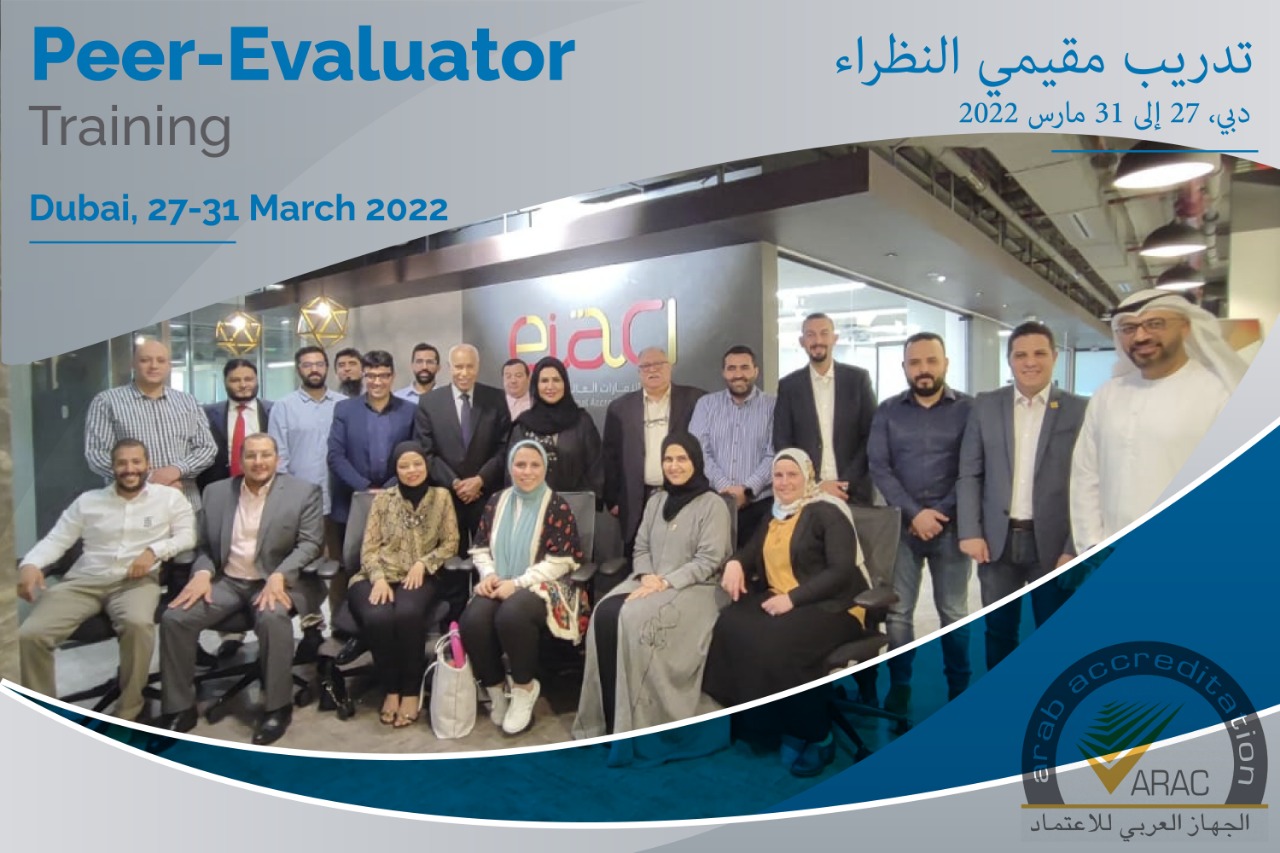
2. Arab Accreditation Week 2022:
In its third edition and on the occasion of World Accreditation Day 2022 ARAC organized the Arab Accreditation Week (AAW) during the period 05-09 June 2022 under the theme “Together towards enhancing the role of accreditation in supporting the Sustainability in Economic Growth and the Environment in the Arab region”.
Several online activities held during the AAW demonstrated how the accreditation infrastructure in the Arab region could be further developed, drawing attention to how accreditation and conformity assessment provide global solutions for global issues and how ARAC is seeking to help organizations measure, manage and/or report sustainable economic growth and environmental performance, in addition to capacity building activities that implemented to strengthen the ARAC members competencies.
2.1 Discussion workshop on ARAC new Strategy 2023 to 2025
Further to the ARAC Executive Committee decision to develop the ARAC new strategy for the period 2023-2025, this workshop aimed to identify the main areas of specific importance for the development of the new strategy based on SWOT (Strength, Weakness, Opportunity and Threat) & PEST (Political, Economical, Social, and Technological) analysis of the current situation.
The inputs from these main areas will provide the basis for formulating the ARAC current position and a desired position for 2025. In order to reach the desired position, the new strategy should cover some strategic and specific objectives, actions and milestones, an updated vision and mission and a set of core values.
2.2 ARAC Capacity Building activities:
2.2.1 Regional Workshop on accreditation of Biobanking
Following the extension of the ILAC MRA to include the accreditation of biobanks as a Level 2 activity using, ISO 20387 “Biobanking – General requirements for biobanking” as the Level 3 normative document, this regional workshop will help Accreditation Body personnel and other ARAC stakeholders interested in the development of accreditation in this exciting area.
The main purpose of this workshop is to provide an overview of ISO 20387 and share the experiences of using the standard from both the Biobank and Accreditation Body perspectives and consider the steps needed to establish an accreditation program for Biobanking.
2.2.2 Regional Workshop on the new IAF Mandatory Document IAF MD 25
In order to harmonize the accreditation practices among ARAC members and support the enhancement of members’ capacities in operating existing accreditation schemes of common interest to ARAC members, ARAC organized the regional workshop on the new IAF MD25:2022 “Criteria for Evaluation of Conformity Assessment Schemes”. The objective of this session is to prepare the ABs as well as the certification bodies (CBs) in the Arab region to fulfil the requirements of this MD.
These online training sessions covered the minimum requirements for conformity assessment schemes (CAS) to be applied by ARAC member ABs when evaluating national, regional or international CAS to ensure they meet requirements specified in ISO/IEC 17011, Clause 4.6.3.
2.3 Webinar on the role of Accreditation and Conformity assessment in achieving sustainability
Economic and environmental objectives in the Arab region
The event, which comes in the context of the implementation of ARAC communication strategy, will further contribute to strengthen the visibility of ARAC inside and outside the accreditation community, supporting recognition and acceptance of the ARAC MLA and services/products provided under accreditation issued by the ARAC AB Members.
By the end of the awareness sessions, the participants had good understanding on how accreditation and conformity assessment provide global solutions for global issues and how ARAC is seeking to help organizations measure, manage and/or report sustainable economic growth and environmental performance.
2.4 Celebration of the WAD 2022
The online celebration included presentations from ARAC and the regional partner organizations to highlight the role of conformity assessment and accreditation in achieving Sustainability in Economic Growth and the Environment in the Arab region. In addition, examples shared on how accreditation and CA services may be applied to meet objectives such as increasing trade, addressing health and safety concerns, contributing to the fight against climate change and protecting the environment by ensuring compliance with standards.
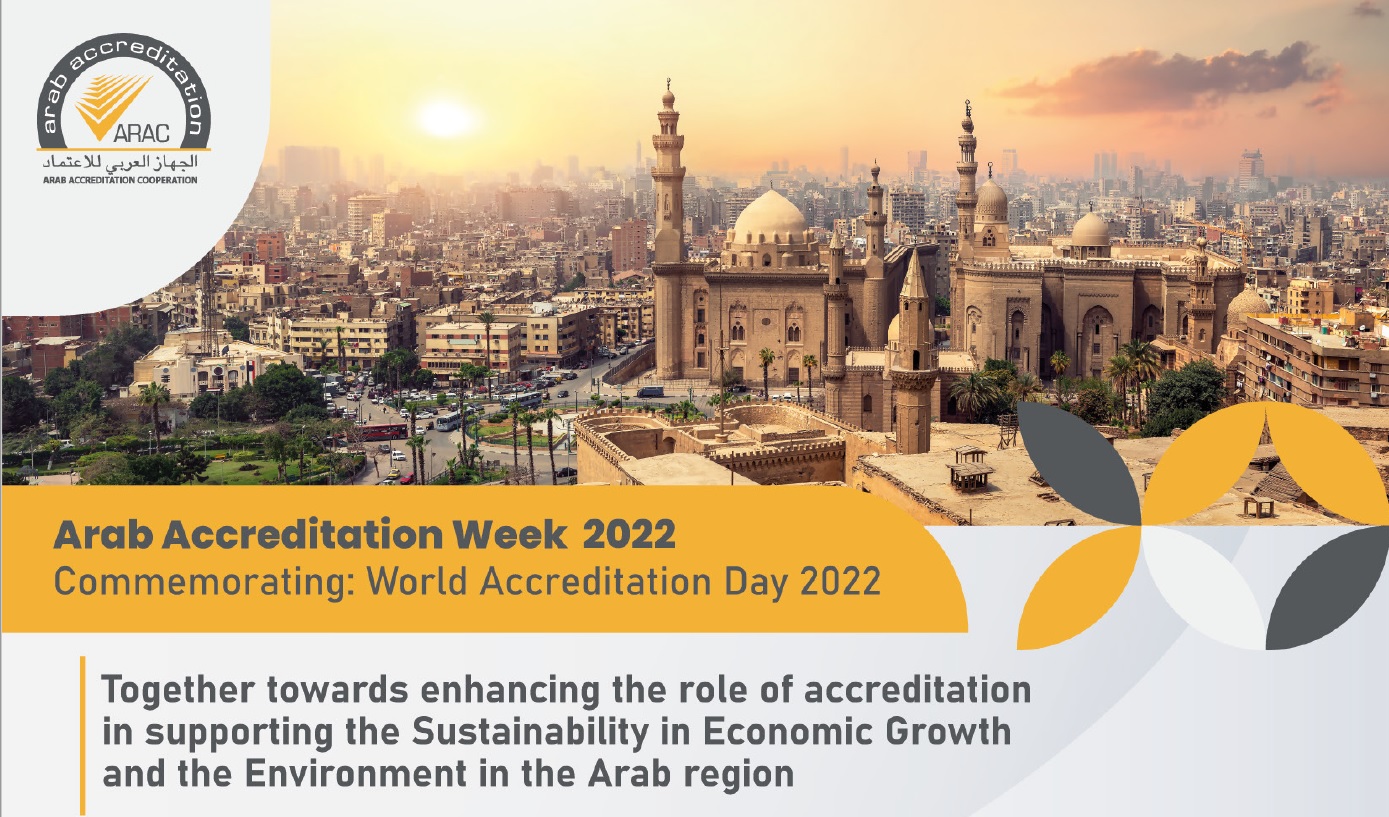
3. ARAC Proficiency Testing Programs:
With the aim to enhance the measurement capability and traceability in countries and economies of the Arab region through a better regional scientific infrastructure, and with the participation of more than 300 laboratories from the Arab region, seven Proficiency Testing (PT) programs have been implemented so far under the auspice of ARAC:
In addition, and following the request of the ARAC Technical Committee to implement a new SARS-CoV-2 (COVID-19) Molecular PT Program, ARAC initiated ARAC PT 007 program in June 2022 with the participation of more than 70 accredited medical laboratories in the Arab region
It should be highlighted that that the results of the participation of the ARAC AB laboratories in the ARAC PT programs are using the peer evaluation process conducted by ARAC with the aim to check the compliance of ARAC ABs with ILAC/IAF A2 and ARAC applicable requirements. In addition, this PT program will enhance the measurement capability and traceability of measurements in countries and economies of the Arab region through a better regional scientific infrastructure.

The preferred means to demonstrate the competence of a notified body is accreditation by the National Accreditation Body. To ensure that the National Accreditation Bodies accredit notified bodies throughout Europe (EU, EFTA, and Turkey) in a harmonized way, EA published the Document on Accreditation for Notification Purposes (EA-2/17). The application of this document is mandatory for all National Accreditation Bodies when accrediting a conformity assessment body to become a notified body. EA-2/17 also applies to bodies performing assessment and verification of constancy of performance under the Construction Products Regulation.
The main purpose of the April 2020 revision was the definition of the preferred harmonised standard(s) for the accreditation of notified bodies. That has been done for each Union harmonisation legislation and module, the specific conformity assessment procedure.
Within three years from publication, all accredited notified bodies shall comply with EA-2/17:2020.
The EA Working Group “Accreditation for Notification” (AfN) performed a consultation among the National Accreditation Bodies regarding the implementation of EA-2/17:2020.
The results demonstrated that many National Accreditation Bodies have already implemented EA-2/17: 2020, which means that the accredited notified bodies comply with EA-2/17.
The most critical issue is to transition all accredited notified bodies to the (preferred) harmonized standard for accreditation as defined in EA-2/17. A National Accreditation Body can only deviate from the application of this standard for a specific legislation and module if the national authority requires another harmonized standard.
The notified bodies shall meet the requirements stipulated in the applicable harmonized standard and the additional requirements indicated in the Union Harmonisation Legislation. Relevant harmonized standards for the accreditation of Conformity Assessment Bodies seeking notification are:
CETA Webinar and partnership renewed between EA and SCC
The Delegation of the European Union in Canada and the Directorate-General for Trade, in collaboration with the Directorate-General for Internal Market, Industry, Entrepreneurship and SMEs, and the Service for Foreign Policy Instruments (FPI) of the European Commission, organized a webinar called ‘How to make use of the EU-Canada Comprehensive Economic and Trade Agreement (CETA) Protocol on Conformity Assessment and whether to extend its scope.
This online seminar was held on the 8th of September 2022 and was part of a series of events organized around the fifth anniversary of CETA’s provisional entry into force. The trade agreement remains a core driver of the EU’s privileged and solid relationship with this close ally and like-minded partner. The current geopolitical context creates momentum for even closer cooperation between the EU and Canada.
CETA includes a Protocol on the Mutual Acceptance of the Results of Conformity Assessment (the CA Protocol). This Protocol establishes mutual recognition of European and Canadian National Accreditation Bodies and Conformity Assessment Bodies to accept the results of each other’s conformity assessment. Implementing the CA Protocol enables the industry to certify products to Canadian requirements in the EU and vice versa. This mutual acceptance of conformity assessment results allows for cost reduction for businesses and consumers and freedom of trade by eliminating technical barriers.
EA and the Standards Council of Canada (SCC) signed a Bilateral Cooperation Agreement (BCA) which was renewed on 29th September 2022. The agreement establishes the conditions and procedures for cooperation between EA and SCC for technical support of activities aimed at mutual recognition of National Accreditation Bodies (NAB) and accredited Conformity Assessment Bodies operating in the EU and Canada and strengthens the implementation of the Protocol, specifically for more product sectors.
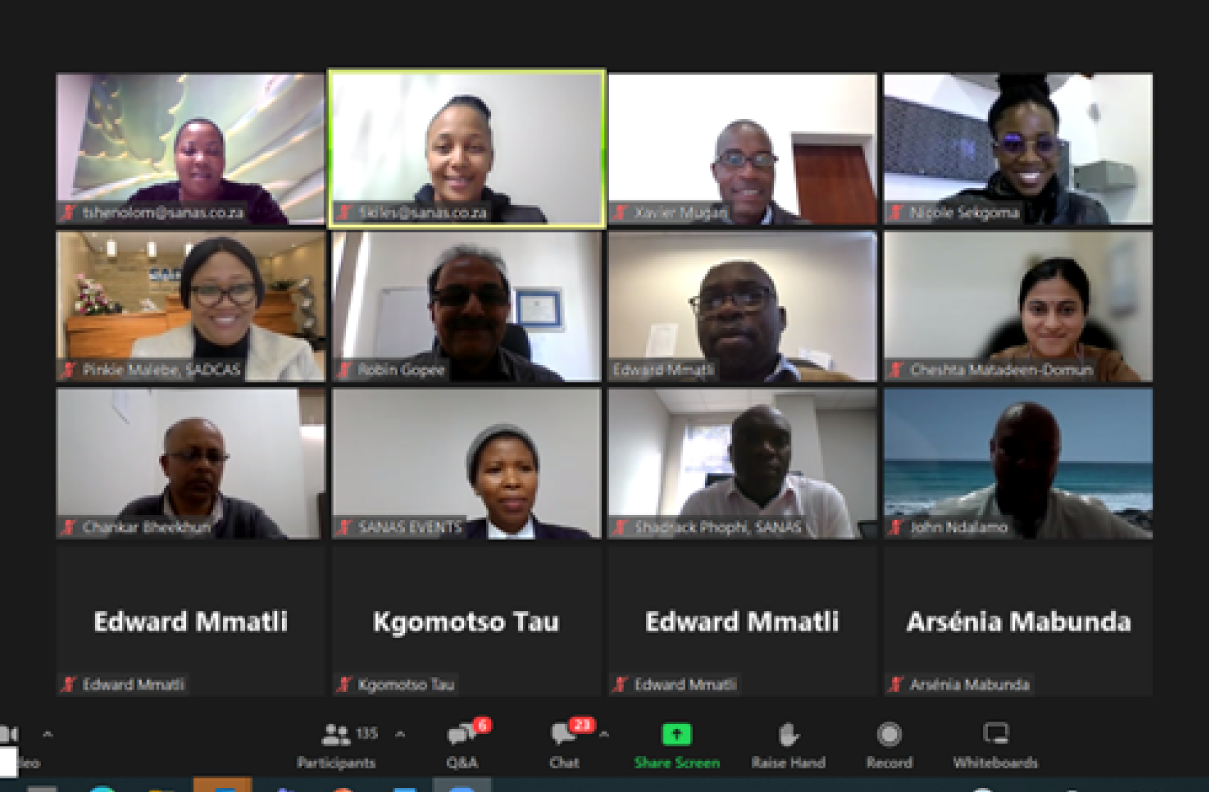
The inaugural Southern African Development Community Cooperation in Accreditation (SADCA) Regional World Accreditation Day (WAD) was successfully celebrated virtually on the 9th June 2022 under the theme: Accreditation: Sustainability in Economic Growth and the Environment. The theme highlights how accreditation supports 9 of the 17 United Nations Sustainable Development Goals (SDGs) through the provision of a trusted platform for defining, developing and verifying requirements for products and services while helping to ensure and demonstrate that products and services meet specified requirements.
The SADCA Regional WAD workshop was attended by more than 170 participants from various backgrounds including the public and private sectors, SADCA members, conformity assessment bodies, and several associations within the Southern African Development Community (SADC) region.
In his capacity as the SADCA Marketing and Communications Committee (MCC) Chair and the Master of Ceremonies for the event, Mr Edward Mmatli, introduced the presenters while SADCA Chair, Mr. Chankar Beekhun gave the welcome remarks.
The following presentations were given during the workshop:
Presentations were followed by a screening of a video produced by ILAC and IAF entitled, “Accreditation: Sustainability in Economic Growth and Environment”. The audience posted comments and questions which were promptly addressed by the organisers and presenters, making for an interactive and engaging webinar experience. Ms. Tshenolo Molamu, SADCA MCC Vice Chair, gave the closing remarks. Various WAD promotional materials that were developed by ILAC and IAF were utilised during the preparation of the event. It is hoped that following the successful regional World Accreditation celebration, SADCA would continue to organise the regional WAD event in future over and above the celebrations that are expected to be held at national level.
SADCA is a cooperation of accreditation bodies in the Southern African Development Community (SADC) region. It is a Technical Barriers to Trade (TBT) Cooperation Structure established under the TBT Annex to the SADC Protocol on Trade. SADCA currently comprises of a total of 21 Members covering 15 out of the 16 SADC Member States:
SADCA’s mission is to manage and expand accreditation recognition arrangements that support SADC industrialisation, facilitate trade and regional integration through credible, reliable and sustainable conformity assessment services that will contribute to the SADC region’s sustainable development.

The Southern African Development Community Cooperation in Accreditation (SADCA) has published its 4th strategic plan. The strategic plan covers the period 2022 to 2026. The process started with the development of the Strategic Plan survey questionnaire which was subsequently circulated to stakeholders for completion. Inputs from stakeholders were then collated and analysed, following which two strategic planning workshops were successfully held, one with stakeholders on 25 March 2021 and then with the SADCA Executive Committee on 26 March 2021. All inputs were then consolidated into a draft strategic plan which was then circulated to all members for comment. The comments received were then considered by the Executive Committee following which the final draft strategic plan was circulated to all members and subsequently approved through Resolution 14 of the 25th SADCA General assembly held on 6 May 2021.
With a fresh design and colourful outlook, the 2022 to 2026 Strategic Plan covers the Chairperson’s Statement; SADCA mandate and aims, vision, mission and values; situation analysis; performance environment; organisational environment; performance information; and links to the long-term infrastructure and other capital plans, private partnerships, financial plan, budget, and indicator description.
Speaking during the SADCA General Assembly, Mrs Maureen Mutasa (SADCA Chair) thanked members for their input into the strategic plan; Dr Josias, the facilitator of the strategic planning process; and the SADCA Executive Committee for their hard work which has resulted in a well thought out strategy for the 2022 to 2026 period, during which the SADCA Mutual Recognition will be internationally recognized. A plan that supports the SADC industrialization thrust and sustainable development in the region, facilitates trade and regional integration and enhances human capital development and competence. A plan where SADCA will work towards self-sustenance of its operational activities and a plan where SADCA’s thrust will also focus on awareness creation on its MRA and designed to also increase membership in SADCA especially private sector involvement in its activities. A plan that avoids unnecessary duplication with the African Accreditation Cooperation (AFRAC). The 2022 to 2026 Strategic Plan was uploaded on the SADCA website and the link circulated to stakeholders for notification of its upload.
|
The Southern African Development Community Cooperation in Accreditation (SADCA) is a Cooperation of accreditation bodies in the Southern African Development Community (SADC) region. SADCA is a Technical Barriers to Trade (TBT) Cooperation Structure established under the TBT Annex to the SADC Protocol on Trade. SADCA currently has a total of 20 Members:
|
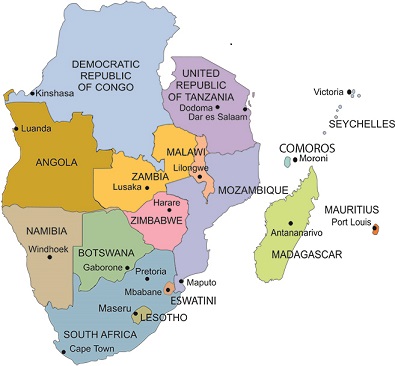 |